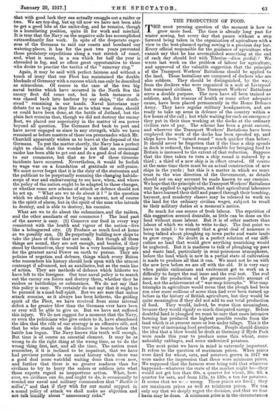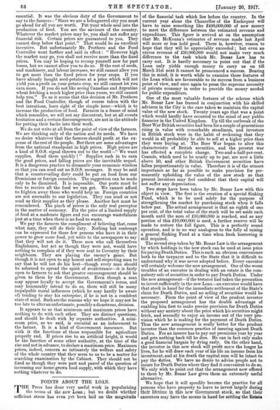THE PRODUCTION OF FOOD. T HE most pressing question of the
moment is how to grow more food. The time is already long past for winter sowing, but every day that passes without a step forward being taken in the organization of agriculture with a view to the best-planned spring sowing is a precious day lost. Every official responsible for the guidance of agriculture who cannot say that he has accomplished something at the end of each day should feel with Tiberius—diein perdidi We wrote last week on the problem of labour for agriculture, and approved of the valuable suggestion that the principle of the Transport Workers' Battalions should be applied to the land. Those battalions are composed of dockers who are also soldiers. They should be distinguished, by the way, from the dockers who were organized in a unit at Liverpool but remained civilians. The Transport Workers' Battalions serve a double purpose. The men have all been trained as soldiers, and, for reasons of health or some other adequate cause, have been placed permanently in the Homo Defence Army. They have regular military headquarters, and are ready to take up arms in defence of the country within a few hours of the call ; but while waiting for such an emergency they put in their time working at the docks at the ordinary civilian rate of pay. The scheme has been a great success, and wherever the Transport Workers' Battalions have been employed the work of the docks has been speeded up, and ships have been " turned round " much quicker than before. It should never be forgotten that if the time a ship spends in dock is reduced, the tonnage available for bringing food to Britain is increased to the extent of that reduction. Suppose that the time taken to turn a ship round is reduced by a third ; a third of a new ship is in effect created. Of course at the same time there must be an actual construction of new ships in the yards ' • but this is a matter in which we must trust to the wise direction of the Government, as details should not on any account be made known to our enemies. We hope that the principle of the Transport Workers' Battalions may be applied to agriculture, and that agricultural labourers who have learned their drill and pawed through their bombing, bayonet, and musketry classes may be released to work on the land for the ordinary civilian wages, subj ect to recall to their military duties at a moment's notice.
So much for one source of fresh labour. The repetition of this suggestion seemed desirable, as little can be done on the land without more labour. But it is of other matters than labour of which we wish to write to-day. The first point we have in mind is to remark that a great deal of nonsense is being talked about ploughing up town parks and waste lands to grow crops. No doubt in a perfect solution of our diffi- culties no land that would grow anything nourishing would be neglected. But it is madness to talk of ploughing up poor and waste land, particularly in semi-poisonous atmospheres, before the land which is now in a partial state of cultivation is made to produce all that it can. We must not be on with the new love before we are off with the old. It is very easy when public enthusiasm and excitement get to work on a difficulty to forget the real issue and the real test. The real issue is the production of the greatest possible amount of food, not the achievement of " war-map triumphs." War-map triumphs in agriculture would mean that the plough had been run over more millions of acres than had ever been turned up before in the history of British agriculture, but they would be quite meaningless if they did not add to our total production of food. They would, indeed, be worse than meaningless, because they would signify so much dissipated energy. Before doubtful land is ploughed. we must be sure that more intensive farming has produced the highest possible results from the land which is at present more or less under tillage. This is the true way of increasing food production. People should dismiss the idea that a blow would be dealt at Germany if Hyde Park were made this year to produce some thin wheat, some unhealthy cabbages, and some undersized potatoes.
The next point we have in mind is extremely important.
It refers to the question of maximum prices. When prices were fixed for wheat, oats, and potatoes grown in 1917 we were under the impression that these were minimum prices. We supposed that the farmers were being told that whatever happened—whatever the state of the market might be—they would not get less than 60s. a quarter for wheat, 38s. 6d. a quarter for oats, and from 115s. to 130s. a ton for potatoes. It seems that we wc..3 wrong. These prices are fixed ; they are maximum prices as well as minimum prices. We can only say that we deeply regret the decision, and that we fear harm may be done. A minimum price is in the circumstances essential. It was the obvious duty of the Government to say to the farmers : "Since we are a beleaguered city you must go ahead for all you are worth. Pilt your whole soul into the production of food. You are the saviours of the country.. Whatever the market prices may be, you shall not suffer any financial risk. Certain prices are guaranteed to you. They cannot drop below that point." That would be an excellent incentive. But unfortunately Mr. Prothero and the Food Controller went further and said in effect : " However high the market may go, you shall not receive more than the fixed prices. You may be hoping to recoup yourself now for past losses, but we cannot allow you to do so. If the cost of seeds, and machinery, and labour increases, we still cannot allow you to get more than the fixed prices for your crops. If you have already bought seed-potatoes at a price which will not yield you a profit on your potato crop, we still cannot let you earn more. If you do not like seeing Canadian and Argentine wheat fetching a much higher price than yours, we still cannot help you." To us it seems that this decision of Mr. Prothero and the Food Controller, though of course taken with the best intentions, loses sight of the simple issue—which is to increase the production of food. Farmers in a frame of mind which resembles, we will not say discontent, but at all events hesitation and a certain discouragement, are not in the attitude for putting their backs into their work.
We do not write at all from the point of view of the farmers. We are thinking only of the nation and its needs. We have no desire whatever that the farmers should profit at the ex- pense of the rest of the people. But there are some advantages from the national standpoint in high prices. High prices are a kind of S.O.S. signal thrown out to the world—" We want supplies. Send them quickly I " Supplies rush in to earn the good prices, and falling prices are the inevitable sequel. It is a dangerous practice to dismantle your economic wireless so that you can send out no S.O.S. messages. It may be said that a countervailing duty could be put on food from our Dominions or foreign countries. The suggestion can be made only to be dismissed. It is impossible. Our ports must be free to receive all the food we can get. We cannot afford to frighten away those who would help us. Foreign countries are not amenable to our legislation. They can send or not send us their supplies as they please. Another fact must be remembered. The pinch of prices is the only real preceptor in the matter of economy. Fix the price of a limited supply of food at a moderate figure and you encourage wastefulness • just at a time when there is no food to waste.
We pay the farmers the compliment of believing that, come what may, they will do their duty. Nothing but contempt can be expressed for those few persons who have it in their power to grow more food, yet write to the newspapers to say that they will not do it. These men who call themselves Englishmen, but act as though they were not, would have nothing to complain of if they were sent to Coventry by their neighbours. They are playing the enemy's game. But though it is not open to any honest and self-respecting man to say that he will not do his best—though every man should be ashamed to spread the spirit of recalcitrance—it is fairly open to farmers to ask that greater encouragement should be given to them by the Government. Even though a man may appear loyally to accept the Government's terms, and may honourably intend to do so, there will still be many impalpable moral influences (which he may hardly be aware of) tending to stay his enterprise, if he is not in a confident state of mind. Such are the reasons why we hope it may not be too late to alter an unfortunate, possibly a disastrous, decision.
It appears to us that minimum and maximum prices have nothing to do with each other. They are distinct questions, and should be dealt with by separate authorities. A mini- mum price, as we said, is essential as an inducement to the farmer. It is a kind of Government insurance. But with it the functions of those responsible for agriculture properly end. If prices rise to an artificial height, it would be the function of some other authority, at the time of the rise and not in advance, to declare a maximum price. Maximum prices, indeed, concern so intimately the welfare and safety of the whole country that they seem to us to be a matter for searching examination by the Cabinet. They should not be fixed as though they were part and parcel of the question of increasing our home-grown food supply, with which they have nothing whatever to do.



































 Previous page
Previous page